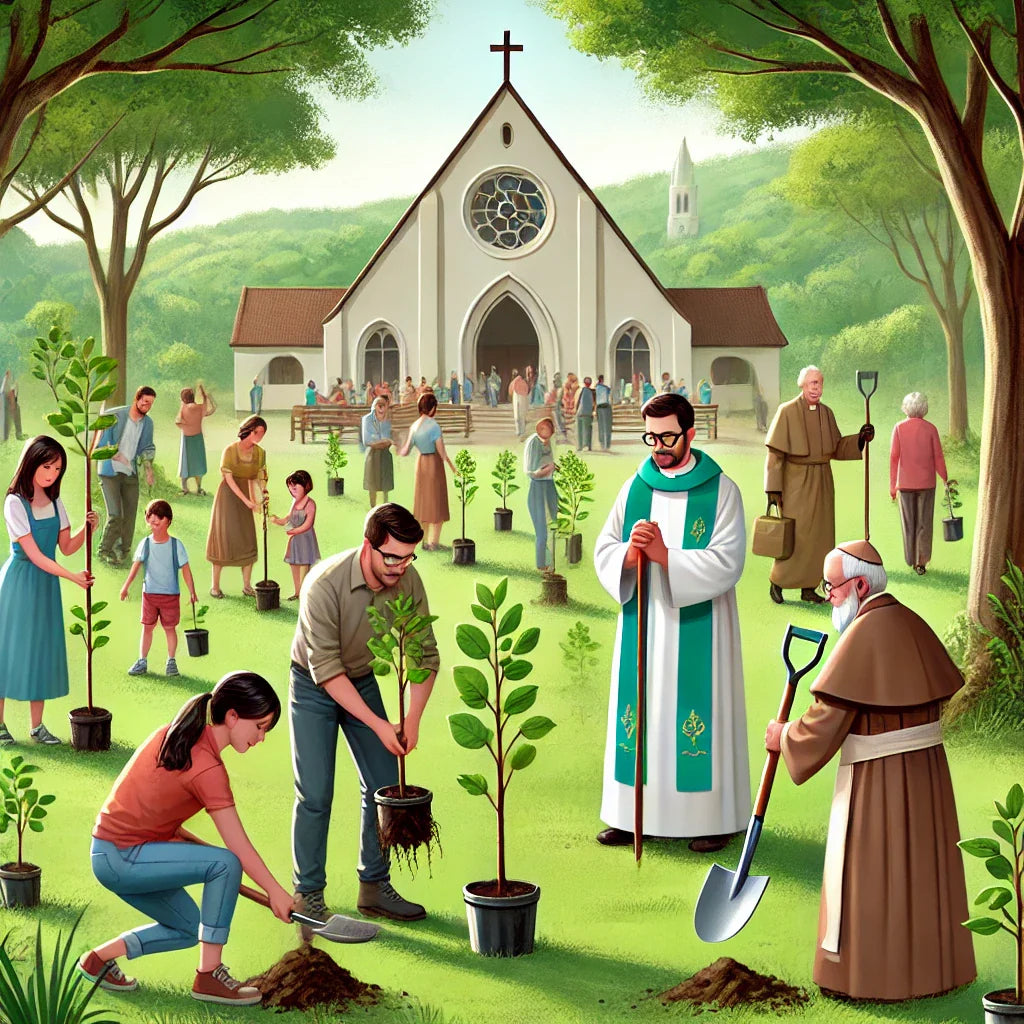
Catholic Perspectives on Climate Change
|
|
Time to read 4 min
|
|
Time to read 4 min
Climate change is one of the most pressing issues of our time, affecting communities, ecosystems, and economies across the globe. Pope Francis, in his encyclical Laudato Si’, calls for urgent and collective action to care for our common home. The encyclical emphasizes that environmental degradation is not only an ecological crisis but also a social and moral issue that disproportionately impacts the poor and vulnerable.
In India, climate change has led to increased instances of droughts, floods, extreme temperatures, and loss of biodiversity. The Catholic Church in India, inspired by Laudato Si’, has been at the forefront of ecological movements, advocating for sustainable practices, conservation, and community-led climate action. This article explores Catholic perspectives on climate change, the role of the Church in addressing environmental issues, and initiatives taken by dioceses and local communities to promote ecological stewardship.
Laudato Si’ underscores the importance of an integral ecology—an approach that connects environmental, economic, social, and cultural dimensions. Pope Francis calls on individuals, communities, and governments to take responsibility for their environmental impact and to adopt a more sustainable way of living.
India faces severe environmental challenges that align with the concerns highlighted in Laudato Si’:
Deforestation and habitat destruction are leading to loss of biodiversity and human displacement.
Pollution in major cities has reached hazardous levels, affecting public health.
Water scarcity and contamination have become major concerns, particularly in rural areas.
Climate-induced disasters such as cyclones, floods, and heatwaves are increasing in frequency and severity.
These challenges necessitate immediate action, and the Catholic Church has taken on a vital role in promoting sustainable development and conservation efforts.
Dioceses and parishes across India have initiated tree-planting drives to combat deforestation and promote biodiversity. Some notable projects include:
“Green Parishes” initiatives where churches commit to planting trees and maintaining green spaces.
Community-led afforestation projects to restore degraded lands and urban areas.
Sacred groves preservation , ensuring traditional forest spaces are protected.
Churches, convents, and schools are adopting eco-friendly measures, such as:
Installing solar panels to reduce reliance on fossil fuels.
Implementing rainwater harvesting systems to promote water conservation.
Conducting waste management programs to minimize landfill waste and encourage recycling.
These initiatives align with Laudato Si’’s emphasis on reducing waste and fostering ecological responsibility within faith communities.
The Catholic Church in India has been proactive in raising environmental awareness through:
Workshops on climate resilience and sustainable agriculture for farmers.
Seminars for schools and colleges integrating Catholic teachings with environmental ethics.
Eco-clubs in educational institutions, encouraging youth-led initiatives.
The intersection of faith and ecology is emphasized in several Church programs:
Nature retreats that promote meditation and reflection on creation.
Liturgical celebrations that integrate ecological themes into Mass and prayer services.
Biblical reflections on stewardship , reinforcing the Christian responsibility to care for the earth.
Catholic organizations and dioceses are actively working with policymakers to advocate for sustainable policies and conservation laws. Their efforts include:
Lobbying against deforestation projects that threaten tribal and rural communities.
Supporting clean energy initiatives and climate-friendly infrastructure.
Encouraging responsible mining, agriculture, and industrial policies that align with ethical environmental standards.
Several Catholic social organizations are empowering local communities to adapt to climate change:
Jesuit initiatives in rural areas promoting sustainable farming techniques.
Catholic Relief Services (CRS) programs supporting disaster preparedness and rehabilitation.
Water conservation projects aimed at ensuring long-term access to clean water.
Recognizing that climate change is a global issue, Catholic groups in India are collaborating with:
Interfaith organizations working towards climate resilience and ecological justice.
International environmental NGOs to implement sustainable development programs.
United Nations climate initiatives that align with Catholic social teachings.
While large-scale initiatives are vital, individual and parish-level participation is equally important. Practical steps include:
Encouraging households to adopt eco-friendly habits such as composting and energy conservation.
Establishing parish-based sustainability committees to oversee local environmental efforts.
Organizing community clean-up drives and waste reduction campaigns.
Catholic schools, seminaries, and catechetical programs must continue integrating Laudato Si’ into their curricula to shape future generations of environmentally-conscious Catholics. Ensuring that students understand the connection between faith and ecology will instill a lifelong commitment to stewardship.
Given the disproportionate impact of climate change on India’s poor and marginalized communities, the Church must focus on developing climate adaptation strategies, such as:
Providing microfinance support for farmers transitioning to sustainable agriculture.
Creating disaster-resilient housing projects for communities prone to flooding or extreme heat.
Strengthening healthcare initiatives to combat climate-related diseases and food insecurity.
With social media and online platforms playing a crucial role in education, Catholic leaders should leverage digital evangelization to:
Share eco-theology resources that emphasize the spiritual duty of environmental stewardship.
Host webinars and virtual discussions on sustainable living and climate resilience.
Build online communities of faith-based environmental activists to encourage greater engagement.
Climate change is not just a scientific or political issue—it is a moral and spiritual challenge that requires immediate and sustained action. Inspired by Pope Francis’s Laudato Si’, the Catholic Church in India has taken significant steps to address environmental concerns through education, advocacy, and community-driven initiatives. However, more work remains to be done.
By integrating ecological values into faith practice, mobilizing communities for sustainable development, and strengthening global partnerships, the Church can be a transformative force in India’s climate movement. Every Catholic, from the parishioner to the priest, has a role to play in preserving our common home. The call to action is clear: through faith and commitment, we must safeguard the earth for future generations.